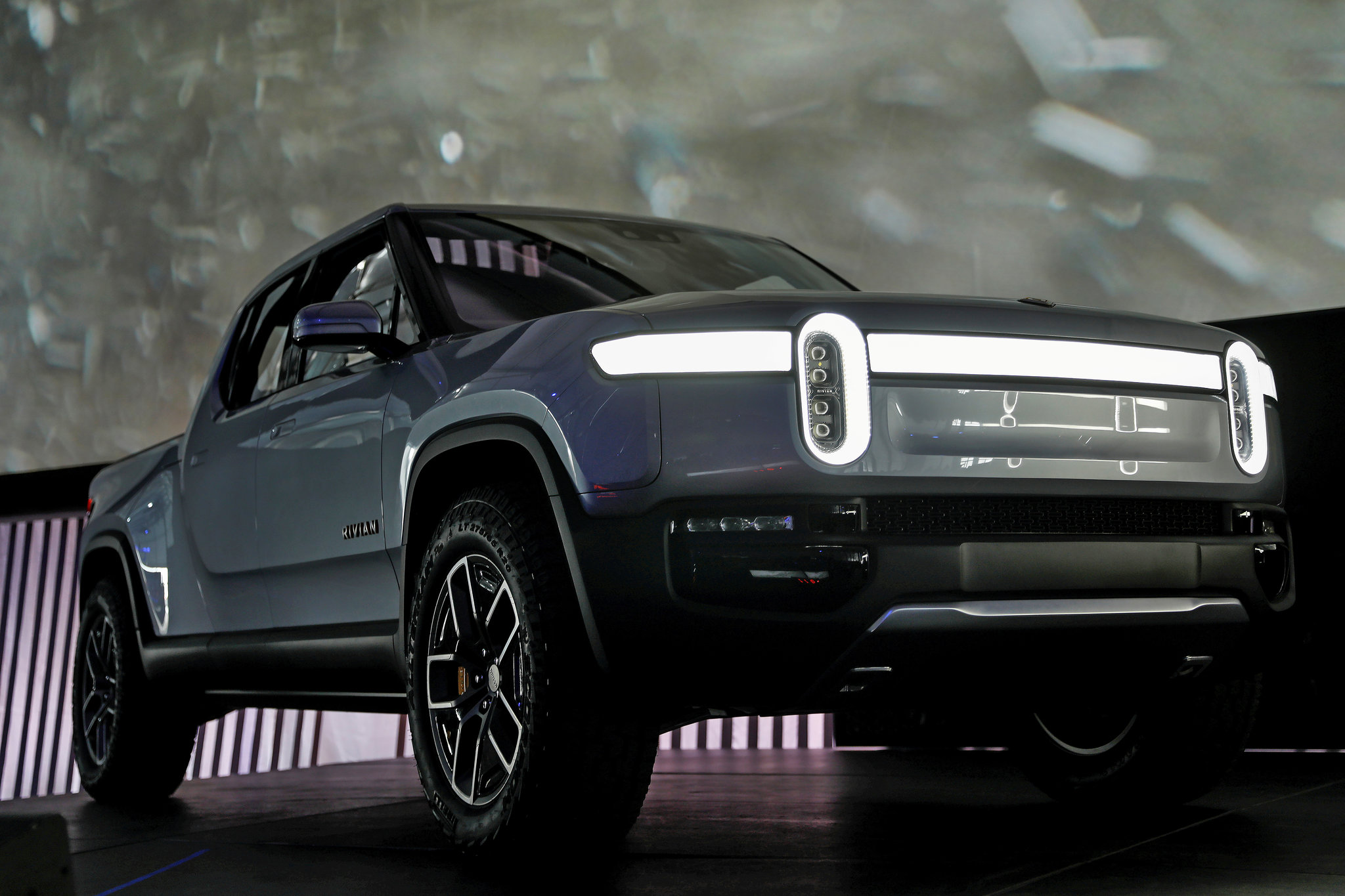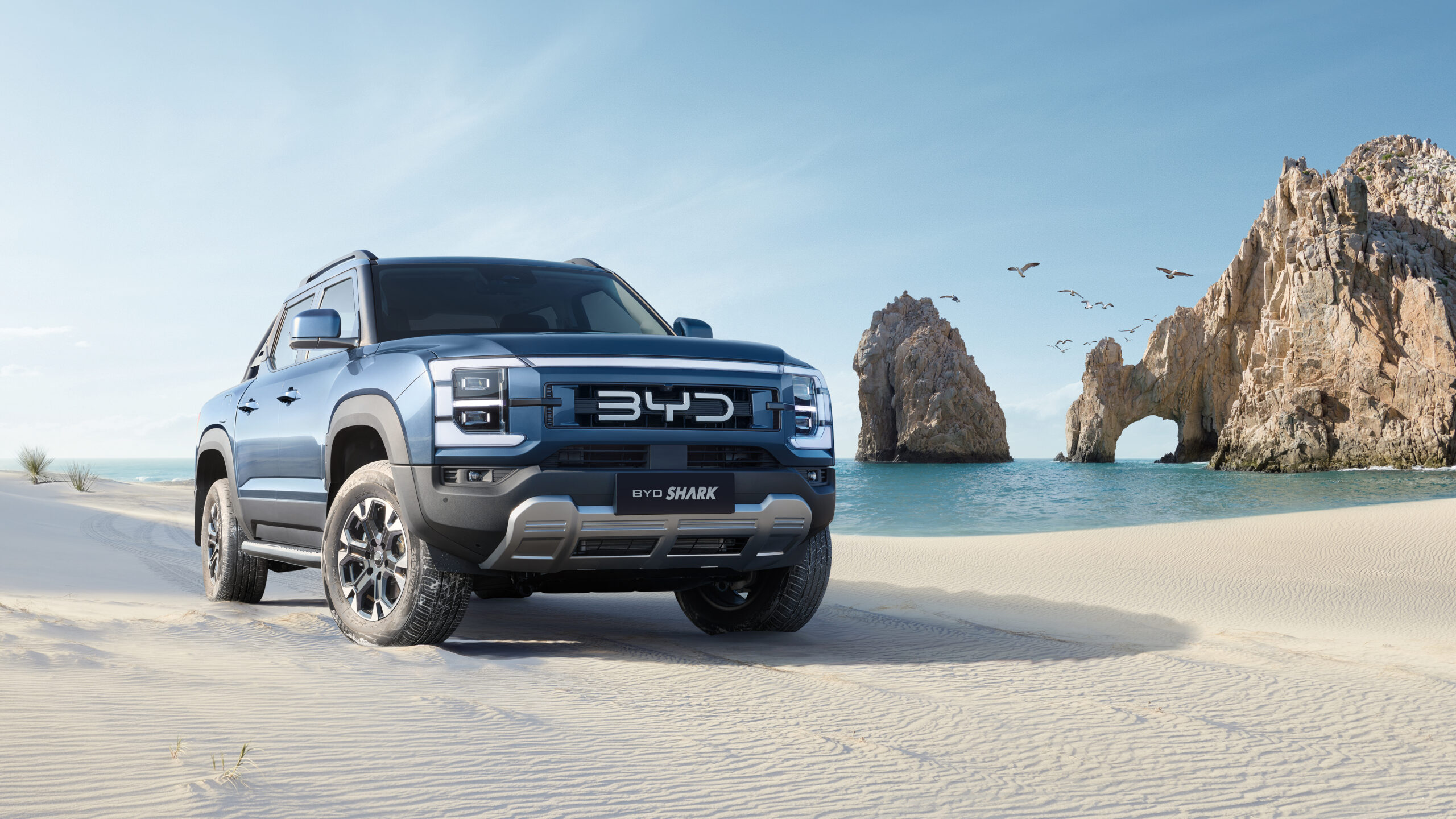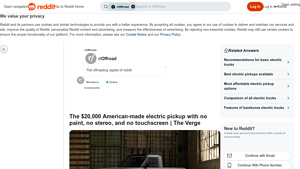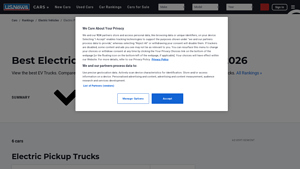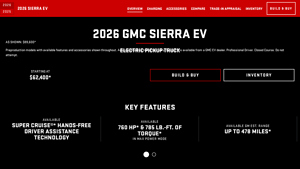Introduction: Navigating the Global Market for pickup electric car
The emergence of pickup electric cars is reshaping the automotive landscape, presenting both opportunities and challenges for international B2B buyers. As businesses in Africa, South America, the Middle East, and Europe seek sustainable and efficient transport solutions, the task of sourcing the right electric pickup truck can be daunting. Key considerations include vehicle range, cargo capacity, charging infrastructure, and overall operational costs. This comprehensive guide aims to navigate these complexities, providing an in-depth analysis of various types of electric pickup trucks, their applications in diverse industries, and crucial insights into supplier vetting processes.
In the following sections, we will explore the latest innovations in electric pickup technology, highlighting models that excel in performance, safety, and adaptability to different market needs. We will also discuss the economic implications of investing in electric vehicles, including potential cost savings, tax incentives, and the long-term benefits of reduced carbon footprints. This guide empowers B2B buyers by equipping them with the knowledge necessary to make informed purchasing decisions, ensuring they can select electric pickup trucks that meet their operational requirements while aligning with their sustainability goals. Whether you are based in the bustling cities of Nigeria or the vibrant markets of Vietnam, this resource will serve as your roadmap in the evolving global market for electric pickups.
Understanding pickup electric car Types and Variations
| Type Name | Key Distinguishing Features | Primary B2B Applications | Brief Pros & Cons for Buyers |
|---|---|---|---|
| Full-Size Electric Pickup | High payload capacity, advanced tech, long range | Construction, logistics, fleet services | Pros: Great for heavy-duty tasks; Cons: Higher initial cost |
| Mid-Size Electric Pickup | Balanced size, range, and capability | Urban deliveries, small business logistics | Pros: Versatile for city use; Cons: Less cargo space than full-size |
| Compact Electric Pickup | Smaller footprint, efficient for urban settings | Last-mile delivery, small fleet operations | Pros: Maneuverable in tight spaces; Cons: Limited towing capacity |
| Off-Road Electric Pickup | Enhanced durability, specialized for rugged terrains | Adventure tourism, outdoor services | Pros: Capable in tough conditions; Cons: May sacrifice range for power |
| Utility Electric Pickup | Designed for functionality, often modular | Maintenance, service industry | Pros: Adaptable for various tasks; Cons: Can be less powerful than traditional trucks |
What Are the Characteristics of Full-Size Electric Pickups?
Full-size electric pickups are designed for maximum utility and performance. They typically offer high payload capacities and advanced technological features such as autonomous driving capabilities and smart connectivity. B2B buyers in sectors like construction and logistics find these vehicles indispensable due to their ability to handle heavy loads and long distances. However, the higher initial investment can be a barrier for some businesses.
How Do Mid-Size Electric Pickups Differ in Functionality?
Mid-size electric pickups strike a balance between size and capability, making them ideal for urban deliveries and small business logistics. These vehicles usually offer a decent range and payload capacity without the bulk of full-size models. Their versatility appeals to B2B buyers looking for efficient solutions in city environments. However, they may not provide the same level of cargo space as larger trucks, which could limit their use in certain applications.
What Are the Advantages of Compact Electric Pickups?
Compact electric pickups are designed for maneuverability and efficiency, making them perfect for last-mile deliveries and small fleet operations. Their smaller footprint allows them to navigate tight urban spaces with ease. While they are ideal for businesses focused on local deliveries, their limited towing capacity may not suit companies needing to transport heavier loads.
What Makes Off-Road Electric Pickups Unique?
Off-road electric pickups are built to withstand rugged terrains and harsh conditions, featuring enhanced durability and specialized suspension systems. They are particularly popular in adventure tourism and outdoor service industries. B2B buyers in these sectors appreciate their capability to handle off-road challenges, although the trade-off may be a shorter range compared to standard electric pickups, which can limit their use in remote areas.
How Are Utility Electric Pickups Designed for Versatility?
Utility electric pickups are designed for maximum functionality and often feature modular designs to accommodate various tools and equipment. They are commonly used in maintenance and service industries, providing a flexible solution for businesses that require adaptability. While these vehicles can handle a range of tasks, they may lack the raw power found in traditional gas-powered trucks, which could be a consideration for heavy-duty applications.
Key Industrial Applications of pickup electric car
| Industry/Sector | Specific Application of pickup electric car | Value/Benefit for the Business | Key Sourcing Considerations for this Application |
|---|---|---|---|
| Agriculture | Transportation of tools and produce | Reduces fuel costs and carbon footprint while enhancing efficiency in logistics. | Evaluate range capabilities and charging infrastructure in rural areas. |
| Construction | On-site material transport | Increases productivity by minimizing downtime and operational costs associated with fuel. | Ensure durability and payload capacity meet construction demands. |
| Logistics and Delivery | Last-mile delivery solutions | Offers cost-effective and eco-friendly alternatives for urban deliveries, improving brand image. | Assess battery life and charging speed to optimize delivery schedules. |
| Mining | Equipment transport and maintenance | Enhances operational efficiency and lowers emissions in sensitive environments. | Consider off-road capabilities and ruggedness for challenging terrains. |
| Tourism and Recreation | Shuttle services for eco-tourism | Attracts environmentally conscious customers and reduces operational costs. | Look for features like passenger capacity and comfort for longer journeys. |
How Are Pickup Electric Cars Transforming Agriculture?
In the agricultural sector, pickup electric cars are utilized for transporting tools and produce from fields to markets. Their electric powertrains significantly reduce fuel costs and carbon footprints, addressing sustainability concerns. Buyers in regions like Africa and South America should consider the vehicle’s range and the availability of charging infrastructure, especially in rural areas where access may be limited. Additionally, the ability to handle various terrains is crucial for effective operation.
What Role Do Electric Pickup Trucks Play in Construction?
Electric pickups are increasingly being used in construction for on-site material transport. Their ability to operate without emitting harmful fumes makes them suitable for urban construction sites where air quality regulations are stringent. Businesses benefit from reduced operational costs associated with fuel, while also increasing productivity by minimizing downtime. Buyers should ensure that the vehicles possess the necessary durability and payload capacity to meet the demanding requirements of construction environments.
How Can Electric Pickup Trucks Improve Logistics and Delivery?
In the logistics and delivery sector, electric pickups serve as effective last-mile delivery solutions. They provide a cost-effective and eco-friendly alternative for urban deliveries, helping businesses enhance their brand image through sustainability. When sourcing these vehicles, companies should evaluate battery life and charging speed to optimize their delivery schedules, ensuring that operational efficiency is maintained without compromising service quality. This is particularly relevant for businesses operating in densely populated areas in Europe and the Middle East.
What Are the Benefits of Electric Pickup Trucks in Mining Operations?
Electric pickup trucks are making inroads into mining operations, where they are used for transporting equipment and personnel. Their low emissions are crucial in sensitive environments, helping companies comply with environmental regulations while also enhancing operational efficiency. Buyers in regions with challenging terrains, such as parts of Africa and South America, should prioritize vehicles with off-road capabilities and rugged construction to withstand harsh conditions.
How Are Electric Pickup Trucks Enhancing Eco-Tourism?
In the tourism and recreation industry, electric pickups are being employed for shuttle services, particularly in eco-tourism. These vehicles attract environmentally conscious customers by providing a sustainable transportation option while also reducing operational costs associated with fuel. When considering electric pickups for tourism, businesses should look for features that enhance passenger comfort and capacity, especially for longer journeys in scenic areas across Europe and the Middle East.
3 Common User Pain Points for ‘pickup electric car’ & Their Solutions
Scenario 1: Limited Charging Infrastructure in Emerging Markets
The Problem: For B2B buyers in regions such as Africa and South America, one of the biggest hurdles in adopting electric pickup trucks is the limited charging infrastructure. Many businesses rely on these vehicles for transportation of goods and services, and the fear of running out of battery power during operations can be a significant deterrent. In remote areas, charging stations may be sparse, leading to operational disruptions and increased anxiety about vehicle range.
The Solution: To address this challenge, businesses should focus on strategically planning their operations around charging capabilities. Buyers can collaborate with local governments and private entities to advocate for the development of charging stations along major transport routes and urban centers. Additionally, investing in vehicles with longer ranges, such as the Rivian R1T or the Ford F-150 Lightning, can mitigate range anxiety. Companies should also consider installing private charging stations at their facilities to ensure that vehicles are always ready for use. This proactive approach not only enhances operational efficiency but also positions businesses as leaders in sustainability.
Scenario 2: High Initial Investment Costs
The Problem: Many B2B buyers are dissuaded by the high upfront costs associated with electric pickup trucks compared to their gasoline counterparts. In regions with tight budgets, such as small to medium enterprises in the Middle East or parts of Europe, the initial investment can appear daunting, despite the long-term savings on fuel and maintenance.
The Solution: To alleviate concerns about the initial investment, businesses should explore various financing options, such as leasing programs or government subsidies aimed at promoting electric vehicle adoption. Manufacturers often offer financial incentives, including tax credits or rebates, which can significantly reduce the effective purchase price. Furthermore, buyers should conduct a thorough total cost of ownership (TCO) analysis that factors in fuel savings, reduced maintenance costs, and potential resale value over time. Engaging with financial advisors who specialize in green investments can also provide tailored solutions that align with the buyer’s financial capabilities and goals.
Scenario 3: Vehicle Performance and Utility Concerns
The Problem: B2B buyers often worry about the performance and utility of electric pickup trucks, especially in comparison to traditional gasoline-powered vehicles. Concerns about payload capacity, towing capabilities, and off-road performance can hinder decisions, particularly for industries that require rugged and reliable vehicles, such as construction or logistics in challenging terrains.
The Solution: Buyers should prioritize electric pickup models specifically designed for heavy-duty use and robust performance. Vehicles like the Chevrolet Silverado EV and the GMC Hummer EV Pickup have been engineered to provide high towing capacities and impressive payload limits, making them suitable for demanding applications. It is crucial to assess the specifications of these vehicles against the operational requirements of the business. Additionally, conducting real-world trials or pilot programs can help businesses evaluate the vehicles’ capabilities in their specific environments. By gathering data from these trials, decision-makers can make informed choices that balance performance needs with sustainability goals. Engaging with manufacturers for tailored solutions can also lead to customized specifications that meet unique business demands.
Strategic Material Selection Guide for pickup electric car
What Are the Key Materials Used in Electric Pickup Trucks?
When selecting materials for electric pickup trucks, several factors must be considered, including performance, cost, and suitability for various environments. Here, we analyze four common materials: aluminum, high-strength steel, carbon fiber, and thermoplastics.
How Does Aluminum Benefit Electric Pickup Trucks?
Aluminum is widely used in electric vehicle (EV) construction due to its lightweight properties, which significantly enhance energy efficiency. Key properties include excellent corrosion resistance and a temperature rating suitable for diverse climates. Its lightweight nature allows for better range and performance, as less energy is required for propulsion.
Pros: Aluminum offers high durability and is relatively easy to manufacture, making it suitable for various components, such as body panels and frames. However, it tends to be more expensive than traditional steel, which may affect overall vehicle pricing.
Cons: While aluminum is lightweight, it can be less rigid than steel, potentially impacting crash safety unless reinforced. Additionally, the manufacturing process can be more complex due to the need for specialized welding techniques.
For international buyers, particularly in regions like Africa and South America, compliance with local standards such as ASTM and JIS is crucial. Buyers should also consider the availability of aluminum recycling facilities, which can impact sustainability efforts.
What Role Does High-Strength Steel Play in Electric Pickup Trucks?
High-strength steel (HSS) is another common material, primarily used for structural components due to its superior strength-to-weight ratio. It offers excellent temperature and pressure ratings, making it suitable for various applications, including chassis and safety structures.
Pros: HSS is highly durable and cost-effective compared to aluminum, making it an attractive option for manufacturers. Its manufacturing processes are well-established, allowing for efficient production.
Cons: The primary drawback is its weight, which can negatively impact the vehicle’s range and efficiency. Additionally, HSS may require additional coatings to prevent corrosion, especially in humid or coastal environments.
For B2B buyers in the Middle East and Europe, understanding compliance with local standards is essential. Many countries have specific regulations regarding the use of steel in automotive applications, which can affect sourcing and manufacturing decisions.
How Does Carbon Fiber Enhance Electric Pickup Truck Performance?
Carbon fiber is increasingly being utilized in high-performance electric pickup trucks due to its exceptional strength and lightweight properties. It has a high temperature rating and excellent resistance to corrosion, making it ideal for various applications, including body panels and interior components.
Pros: The primary advantage of carbon fiber is its remarkable strength-to-weight ratio, which can significantly improve vehicle performance and range. It also allows for innovative designs that enhance aesthetics and functionality.
Cons: However, carbon fiber is one of the most expensive materials available, which can lead to higher retail prices. Additionally, its manufacturing process is complex and requires specialized skills, which may not be readily available in all regions.
For international buyers, particularly in Europe and North America, compliance with specific quality standards is vital. Buyers should also consider the availability of carbon fiber suppliers in their region to ensure a steady supply chain.
What Are the Advantages of Using Thermoplastics in Electric Pickup Trucks?
Thermoplastics are increasingly being used in electric pickup trucks for various applications, including interior components and lightweight structural parts. They offer good temperature and pressure ratings, along with decent chemical resistance.
Pros: Thermoplastics are cost-effective and can be produced using established manufacturing techniques like injection molding. They are also lightweight, which contributes to overall vehicle efficiency.
Cons: The primary limitation is their lower durability compared to metals, which may affect long-term performance. Additionally, thermoplastics can be sensitive to UV exposure, leading to degradation over time.
For B2B buyers in regions like Africa and South America, understanding the local availability of thermoplastic materials and compliance with international standards is crucial for ensuring product quality and performance.
Summary Table of Material Selection for Electric Pickup Trucks
| Material | Typical Use Case for pickup electric car | Key Advantage | Key Disadvantage/Limitation | Relative Cost (Low/Med/High) |
|---|---|---|---|---|
| Aluminum | Body panels, frames | Lightweight, excellent corrosion resistance | Higher cost, complex manufacturing | High |
| High-Strength Steel | Chassis, safety structures | Cost-effective, highly durable | Heavier, requires corrosion protection | Medium |
| Carbon Fiber | Body panels, interior components | Exceptional strength-to-weight ratio | Very high cost, complex manufacturing | High |
| Thermoplastics | Interior components, lightweight parts | Cost-effective, lightweight | Lower durability, UV sensitivity | Low |
This analysis provides a comprehensive overview of the materials used in electric pickup trucks, aiding B2B buyers in making informed decisions based on performance, cost, and regional considerations.
In-depth Look: Manufacturing Processes and Quality Assurance for pickup electric car
What Are the Main Stages in Manufacturing Electric Pickup Trucks?
The manufacturing process for electric pickup trucks is intricate, involving several key stages that ensure the final product is not only functional but also meets high-quality standards. Here’s a breakdown of the main stages involved:
-
Material Preparation: This initial phase focuses on sourcing high-quality materials tailored for electric vehicle (EV) production. This includes advanced composites, aluminum for lightweight structures, and high-strength steel for safety. Manufacturers must ensure that materials meet specific industry standards and are suitable for electric powertrains.
-
Forming: During this stage, raw materials are shaped into components through various techniques, including stamping, casting, and extrusion. Advanced forming techniques such as hydroforming are also employed to create complex shapes with minimal waste. This is crucial for achieving the lightweight yet durable structures necessary for EVs.
-
Assembly: This stage is where the various components, including the battery pack, electric motors, and chassis, are integrated. Automation plays a significant role here, with robotics enhancing precision and efficiency. The assembly line is designed for flexibility to accommodate different models and configurations, ensuring that manufacturers can respond quickly to market demands.
-
Finishing: The finishing stage involves surface treatments, painting, and quality checks. This is essential for both aesthetic appeal and corrosion resistance. Advanced techniques, such as electrocoating, are used to ensure a uniform and durable finish that meets regulatory requirements for durability and environmental safety.
What Quality Assurance Standards Are Relevant for Electric Pickup Trucks?
Quality assurance (QA) is paramount in the manufacturing of electric pickup trucks, ensuring that each vehicle meets rigorous safety and performance standards. Here are some key international and industry-specific standards:
-
ISO 9001: This standard outlines requirements for a quality management system (QMS) and is crucial for manufacturers aiming for operational excellence. Certification in ISO 9001 indicates that a company consistently provides products that meet customer and regulatory requirements.
-
CE Marking: For manufacturers targeting the European market, CE marking is essential. It signifies that the vehicle complies with EU safety, health, and environmental protection standards.
-
API Standards: While primarily associated with the petroleum and natural gas industries, certain API standards may be relevant for electric vehicle components, particularly those related to battery production and safety.
What Are the Key QC Checkpoints in Electric Pickup Truck Manufacturing?
Quality control checkpoints are strategically placed throughout the manufacturing process to ensure compliance with standards and specifications. The following checkpoints are commonly utilized:
-
Incoming Quality Control (IQC): This involves inspecting raw materials and components as they arrive at the manufacturing facility. Ensuring that suppliers meet the required specifications is critical to maintaining overall product quality.
-
In-Process Quality Control (IPQC): Continuous monitoring during the manufacturing process is essential for identifying defects early. This may involve statistical process control (SPC) techniques to track variations and maintain process stability.
-
Final Quality Control (FQC): Before vehicles are shipped, a comprehensive inspection is conducted. This includes functional testing, safety checks, and compliance with environmental regulations. Any vehicle that does not meet quality standards is reworked or scrapped.
How Can B2B Buyers Verify Supplier Quality Control Processes?
For B2B buyers, particularly those in emerging markets such as Africa, South America, the Middle East, and Europe, verifying a supplier’s quality control processes is crucial. Here are some actionable steps:
-
Conduct Supplier Audits: Regular audits allow buyers to assess the manufacturing processes and quality management systems in place. This can help identify any potential risks or areas for improvement.
-
Request Quality Assurance Reports: Suppliers should provide detailed reports on their quality control measures, including data on defect rates, testing results, and corrective actions taken in response to quality issues.
-
Engage Third-Party Inspectors: Utilizing independent inspection agencies can provide an objective assessment of the supplier’s quality processes. These inspectors can perform random checks and detailed evaluations of the production line.
What Testing Methods Are Commonly Used in Electric Pickup Truck Manufacturing?
Testing methods are integral to ensuring that electric pickup trucks are safe, reliable, and meet performance expectations. Here are some common testing methods employed:
-
Performance Testing: This includes assessing acceleration, braking, and handling under various conditions. Real-world simulations help manufacturers understand how vehicles will perform in diverse environments.
-
Battery Testing: Given the central role of the battery in electric vehicles, rigorous testing is conducted to assess energy capacity, charging efficiency, and thermal management. This includes cycle testing to evaluate longevity and degradation over time.
-
Safety Testing: Compliance with safety regulations is crucial. Crash testing, including frontal and side impact tests, is performed to ensure the structural integrity of the vehicle. Additionally, electromagnetic compatibility (EMC) testing is conducted to ensure the vehicle’s electronic systems do not interfere with each other.
What Are the Nuances of QC and Certification for International B2B Buyers?
For international B2B buyers, understanding the nuances of quality control and certification is essential for successful procurement. Here are some considerations:
-
Regulatory Compliance: Different regions have varying regulations regarding vehicle safety and emissions. Buyers must ensure that suppliers are compliant with the relevant standards in their target markets.
-
Cultural and Operational Differences: Buyers should be aware of potential cultural differences that may affect communication and operational practices. Building strong relationships with suppliers can help bridge these gaps.
-
Supply Chain Transparency: Increasingly, buyers are looking for transparency in the supply chain. Suppliers who provide visibility into their sourcing and manufacturing processes are more likely to build trust and foster long-term partnerships.
In conclusion, understanding the manufacturing processes and quality assurance protocols for electric pickup trucks is vital for B2B buyers. By focusing on these aspects, buyers can make informed decisions, ensuring they partner with manufacturers who prioritize quality and compliance.
Practical Sourcing Guide: A Step-by-Step Checklist for ‘pickup electric car’
This guide aims to provide international B2B buyers with a comprehensive checklist for sourcing electric pickup trucks. As the demand for sustainable transportation solutions grows, understanding the critical steps in the procurement process is essential to ensure that your investment aligns with your operational needs and sustainability goals.
Step 1: Define Your Technical Specifications
Establishing clear technical specifications is crucial before initiating the procurement process. Consider factors such as payload capacity, towing capabilities, range, and battery technology. These specifications will help narrow down options that meet your operational requirements and ensure efficiency in your fleet management.
Step 2: Assess Market Demand and Trends
Understanding current market trends and demand for electric pickups in your region is vital. Research the adoption rates of electric vehicles (EVs) in your target markets, particularly in regions like Africa and South America, where infrastructure may vary. This knowledge will assist in anticipating future needs and aligning your sourcing strategy with market dynamics.
Step 3: Evaluate Potential Suppliers
Thoroughly vet potential suppliers to ensure reliability and quality. Look for established manufacturers with a proven track record in the electric vehicle sector. Request company profiles, case studies, and references from other buyers in similar industries or regions. This diligence will help mitigate risks associated with supplier performance and product quality.
Step 4: Verify Compliance and Certifications
Ensure that the electric pickups you are considering comply with local regulations and international safety standards. Check for necessary certifications such as ISO, EPA ratings, and any regional compliance marks. This step is crucial not only for legal reasons but also to ensure the vehicles meet performance expectations in your specific market environment.
Step 5: Consider Total Cost of Ownership (TCO)
Calculating the total cost of ownership is essential when evaluating electric pickups. This includes not just the purchase price but also operational costs such as charging infrastructure, maintenance, insurance, and potential government incentives. Understanding TCO will provide a clearer picture of the long-term financial implications of your investment.
Step 6: Request Demonstrations and Test Drives
Before finalizing your purchase, arrange for product demonstrations and test drives. This hands-on experience allows you to assess the vehicle’s performance, comfort, and usability in real-world conditions. Engaging with the vehicles firsthand will help you make a more informed decision and identify any potential issues early in the process.
Step 7: Negotiate Terms and Finalize Contracts
Once you have chosen a supplier, focus on negotiating favorable terms and conditions. Pay attention to warranties, after-sales support, and service agreements. A well-structured contract that includes clear terms on delivery timelines, payment schedules, and performance guarantees will protect your interests and ensure a smooth procurement process.
By following this structured checklist, B2B buyers can navigate the complexities of sourcing electric pickup trucks effectively, ensuring their investment contributes to operational efficiency and sustainability goals.
Comprehensive Cost and Pricing Analysis for pickup electric car Sourcing
What Are the Key Cost Components in Sourcing Pickup Electric Cars?
When analyzing the cost structure for sourcing electric pickup trucks, several components must be considered:
-
Materials: The cost of raw materials, including metals (like aluminum and steel), plastics, and battery components, significantly influences the overall price. Advanced battery technologies, such as lithium-ion, are particularly costly but crucial for performance.
-
Labor: Labor costs can vary widely based on geographic location and the skill level required for assembly and production. Skilled labor is essential for the intricate assembly of electric drivetrains and electronic systems.
-
Manufacturing Overhead: This includes costs associated with factory maintenance, utilities, and administrative expenses. Efficient production processes can lower overhead costs, making the final product more competitive.
-
Tooling: The initial investment in tooling, such as molds and dies for body parts, is significant. These costs are amortized over the production volume, impacting pricing strategies.
-
Quality Control (QC): Ensuring the vehicles meet safety and performance standards requires investment in quality assurance processes. This can include testing facilities and compliance certifications, which add to the overall cost.
-
Logistics: Transportation costs for delivering raw materials to factories and finished vehicles to customers are crucial. Global supply chain disruptions can increase these costs, making logistics a key factor in pricing.
-
Margin: Manufacturers typically set a margin to cover risks and achieve profitability. This margin can fluctuate based on market competition and demand.
How Do Price Influencers Affect the Cost of Pickup Electric Cars?
Several factors influence the pricing of electric pickup trucks, particularly for international B2B buyers:
-
Volume/MOQ (Minimum Order Quantity): Larger orders can lead to lower per-unit costs due to economies of scale. Buyers should consider their purchasing volume when negotiating prices.
-
Specifications and Customization: Custom features or specifications can increase costs. Buyers should evaluate whether specific enhancements are essential or if standard models suffice.
-
Materials Quality and Certifications: Higher quality materials and necessary certifications (like safety and environmental standards) can raise costs. Buyers should weigh the benefits of premium materials against their budget constraints.
-
Supplier Factors: The reputation and reliability of suppliers can significantly impact pricing. Established suppliers may charge more due to their track record and the quality of service they provide.
-
Incoterms: Understanding Incoterms is crucial for international transactions. These terms define the responsibilities of buyers and sellers in shipping, insurance, and tariffs, affecting the total landed cost of the vehicles.
What Buyer Tips Can Help in Negotiating Prices for Electric Pickup Trucks?
For B2B buyers, particularly in regions like Africa, South America, the Middle East, and Europe, several strategies can enhance cost-efficiency:
-
Negotiation: Engage suppliers in discussions to explore potential discounts for bulk purchases or long-term contracts. Building a strong relationship can also lead to better pricing.
-
Total Cost of Ownership (TCO): Look beyond the initial purchase price. Consider factors like maintenance, fuel savings, and depreciation. Electric vehicles often have lower operating costs, which can justify a higher upfront price.
-
Pricing Nuances for International Buyers: Be aware of additional costs such as import duties, taxes, and tariffs that can affect the final purchase price. Understanding local regulations regarding electric vehicles can also provide leverage in negotiations.
-
Research Market Trends: Staying informed about market developments and competitor pricing can empower buyers to negotiate better deals.
-
Trial and Feedback: If possible, test vehicles before committing to a large order. Gathering feedback from users can help in making informed decisions regarding performance and reliability.
Disclaimer
The prices mentioned in this analysis are indicative and subject to change based on market conditions, supplier negotiations, and currency fluctuations. It is advisable for buyers to conduct thorough research and obtain quotes tailored to their specific needs and circumstances.
Alternatives Analysis: Comparing pickup electric car With Other Solutions
Understanding the Alternatives to Pickup Electric Cars
As the market for electric vehicles (EVs) continues to evolve, B2B buyers face a variety of options when considering transportation solutions for their businesses. While electric pickup trucks offer a compelling mix of performance, sustainability, and innovation, it is essential to evaluate them against alternative vehicles and technologies that may also meet operational needs. This section explores the key alternatives to electric pickup trucks, focusing on their respective advantages and limitations.
Comparison Table of Alternatives
| Comparison Aspect | Pickup Electric Car | Diesel Pickup Truck | Traditional Gasoline Pickup Truck |
|---|---|---|---|
| Performance | High torque, rapid acceleration, good range (240-492 miles) | Strong towing capacity, good range | Sufficient power for most tasks, good range |
| Cost | Higher initial purchase price ($51,975 – $99,045) but lower operational costs | Moderate initial cost, fluctuating fuel prices | Lower initial cost but higher fuel and maintenance costs |
| Ease of Implementation | Requires charging infrastructure; may need upgrades to existing systems | Established refueling infrastructure; minimal changes required | Established refueling infrastructure; minimal changes required |
| Maintenance | Lower maintenance due to fewer moving parts; software updates | Higher maintenance costs due to engine complexity | Higher maintenance costs due to engine complexity |
| Best Use Case | Urban and regional operations, eco-conscious businesses | Heavy-duty tasks, off-road applications | Versatile applications, traditional work environments |
In-Depth Analysis of Alternatives
Diesel Pickup Truck
Diesel pickup trucks are a staple in many industries, known for their robust performance and excellent towing capacity. They excel in heavy-duty applications, making them ideal for businesses that require substantial hauling capabilities. However, diesel engines come with higher maintenance costs and are subject to fluctuating fuel prices, which can impact overall operational budgets. Additionally, increasing environmental regulations may limit their long-term viability in certain markets.
Traditional Gasoline Pickup Truck
Traditional gasoline pickup trucks provide a familiar and reliable option for many businesses. They tend to have lower initial costs compared to electric and diesel alternatives, making them accessible for a wide range of buyers. However, these vehicles often incur higher fuel and maintenance expenses over their lifespan. While they are versatile and can be used in various applications, their reliance on fossil fuels may not align with the sustainability goals of forward-thinking companies.
Conclusion: How to Choose the Right Transportation Solution
When selecting a transportation solution, B2B buyers must consider their specific operational needs, budget constraints, and long-term goals. Electric pickup trucks offer a sustainable and innovative choice, particularly for businesses focused on reducing their carbon footprint and benefiting from lower maintenance costs. However, for operations requiring heavy-duty performance or established refueling infrastructure, diesel or traditional gasoline pickup trucks may still be viable options. Ultimately, the decision should be guided by a thorough assessment of how each alternative aligns with the organization’s operational objectives, financial considerations, and commitment to sustainability.
Essential Technical Properties and Trade Terminology for pickup electric car
What Are the Key Technical Properties of Electric Pickup Trucks?
When evaluating electric pickup trucks for B2B procurement, understanding key technical specifications is crucial. Here are some critical properties to consider:
1. Battery Capacity (kWh)
Battery capacity, measured in kilowatt-hours (kWh), determines the amount of energy stored in the vehicle’s battery. A higher kWh rating translates to a longer driving range. For instance, electric pickups like the Rivian R1T offer battery options that provide up to 420 miles of range. For B2B buyers, selecting a truck with adequate battery capacity is essential for operational efficiency, especially in regions with limited charging infrastructure.
2. Towing Capacity (lbs)
Towing capacity indicates how much weight a pickup can safely tow. This is particularly important for businesses that require hauling trailers, equipment, or goods. Electric pickups like the Ford F-150 Lightning have impressive towing capabilities (up to 10,000 lbs), making them suitable for heavy-duty applications. Buyers should assess their specific towing needs to ensure the chosen model meets operational requirements.
3. Payload Capacity (lbs)
Payload capacity refers to the maximum weight that can be carried in the truck bed. This specification is critical for businesses that rely on transporting materials. For example, the Chevrolet Silverado EV boasts a significant payload capacity, enabling it to handle various cargo types. Understanding payload limits helps buyers optimize their logistics and ensure compliance with safety regulations.
4. Charging Time (hours)
Charging time is the duration required to recharge the vehicle’s battery fully. Fast-charging capabilities can significantly reduce downtime, which is vital for businesses that operate on tight schedules. Electric pickups with fast-charging options, like the Tesla Cybertruck, can recharge to 80% in about 30 minutes, enhancing operational efficiency. Buyers should compare charging times to ensure they align with their business needs.
5. Drive Modes and Terrain Adaptability
Electric pickups often come equipped with multiple drive modes that allow for optimization based on terrain (e.g., off-road, towing, or eco modes). This adaptability is beneficial for businesses that operate in diverse environments. For instance, Rivian’s R1T features up to nine drive modes, making it suitable for various applications from construction sites to outdoor adventures. Selecting a vehicle with suitable drive modes can enhance performance and safety.
What Are Common Trade Terms Used in the Electric Pickup Truck Industry?
Navigating the electric vehicle (EV) market requires familiarity with specific industry terminology. Here are some essential terms:
1. OEM (Original Equipment Manufacturer)
An OEM is a company that produces parts and equipment that may be marketed by another manufacturer. In the electric pickup sector, OEMs play a critical role in ensuring quality and compliance with industry standards. For B2B buyers, understanding OEM relationships can help in sourcing reliable and compatible components.
2. MOQ (Minimum Order Quantity)
MOQ refers to the minimum number of units that a supplier is willing to sell. This term is vital for businesses looking to purchase electric pickups in bulk. Knowing the MOQ helps in planning budgets and inventory, particularly for fleet purchases, ensuring that businesses can meet operational demands without excess expenditure.
3. RFQ (Request for Quotation)
An RFQ is a document issued by a buyer to solicit price quotes from suppliers for specific products or services. In the context of electric pickups, an RFQ can help businesses obtain competitive pricing and terms from various manufacturers. This process is crucial for making informed purchasing decisions.
4. Incoterms (International Commercial Terms)
Incoterms are a set of predefined international trade terms that clarify the responsibilities of buyers and sellers. Understanding these terms is essential for B2B transactions involving electric pickups, as they define who bears the risk and costs associated with shipping, delivery, and insurance. Proper knowledge of Incoterms can help businesses avoid disputes and ensure smooth logistics.
5. LTV (Loan-To-Value)
LTV refers to the ratio of a loan to the value of the asset purchased. For companies financing electric pickups, understanding LTV is crucial for determining loan eligibility and terms. A lower LTV typically results in better financing conditions, making it an important consideration for B2B buyers.
In summary, being well-versed in both the technical specifications and trade terminology of electric pickup trucks enables B2B buyers to make informed decisions that align with their operational needs and financial objectives.
Navigating Market Dynamics and Sourcing Trends in the pickup electric car Sector
What Are the Global Drivers Influencing the Pickup Electric Car Market?
The pickup electric car market is witnessing significant growth, driven by global trends such as increasing environmental regulations, rising fuel prices, and a growing consumer preference for sustainable transportation options. International B2B buyers from regions like Africa, South America, the Middle East, and Europe are particularly influenced by these factors as they seek to align with eco-friendly practices and capitalize on the evolving automotive landscape. The shift towards electric vehicles (EVs) is not just a trend but a necessary adaptation in response to climate change and urbanization challenges.
Emerging technologies play a pivotal role in this sector, including advancements in battery technology, which enhance range and reduce charging time. The rise of smart features and connectivity in vehicles is reshaping buyer expectations, creating demand for vehicles equipped with advanced infotainment systems, safety features, and autonomous capabilities. Furthermore, as manufacturers focus on improving the durability and efficiency of electric powertrains, international buyers can expect enhanced performance metrics that align with their operational needs.
How Can B2B Buyers Navigate Current Sourcing Trends in Electric Pickups?
International buyers should consider strategic partnerships with manufacturers that prioritize innovation and quality. Sourcing trends indicate a shift towards companies that integrate cutting-edge technology and sustainable practices in their production processes. For instance, companies like Rivian and Ford are setting benchmarks with their robust electric pickup models that cater to both performance and eco-friendliness. Buyers should also evaluate the availability of charging infrastructure in their regions, as this is crucial for the operational viability of electric pickups.
What Is the Importance of Sustainability and Ethical Sourcing in the Pickup Electric Car Sector?
Sustainability is at the forefront of the electric vehicle industry, particularly in the pickup segment. Environmental impact considerations are paramount, as the production and disposal of batteries can have significant ecological consequences. International B2B buyers must prioritize suppliers who demonstrate a commitment to ethical sourcing practices, ensuring that raw materials for batteries, such as lithium and cobalt, are obtained responsibly.
Moreover, the adoption of ‘green’ certifications is becoming increasingly relevant. Buyers should look for manufacturers who comply with international environmental standards and utilize sustainable materials in their vehicles. This not only enhances brand reputation but also aligns with the growing demand for corporate social responsibility among consumers and stakeholders alike.
How Has the Pickup Electric Car Sector Evolved Over Time?
The evolution of the pickup electric car sector has been marked by technological advancements and shifting consumer perceptions. Initially perceived as niche vehicles, electric pickups have gained traction due to improved battery technology, which has significantly extended driving ranges and reduced charging times. Early models like the Tesla Cybertruck and the Rivian R1T have paved the way for a new class of vehicles that combine utility with sustainability.
As global manufacturers continue to innovate, the landscape is becoming increasingly competitive, with traditional automakers now entering the electric pickup market. This evolution reflects a broader trend toward electrification across all vehicle classes, as businesses and consumers alike recognize the importance of reducing carbon footprints and embracing sustainable transportation solutions.
Frequently Asked Questions (FAQs) for B2B Buyers of pickup electric car
-
How do I select the right electric pickup truck for my business needs?
Choosing the right electric pickup truck involves evaluating several factors, including range, payload capacity, and the specific requirements of your operations. Assess the typical distances your fleet will travel and ensure the vehicle has sufficient range to meet those needs. Look for models that offer flexible cargo space and innovative features tailored for your industry, such as towing capabilities or off-road performance. It’s also advisable to consider local charging infrastructure to ensure seamless operations. -
What are the advantages of electric pickup trucks over traditional gasoline models?
Electric pickup trucks offer several benefits, including lower operating costs due to reduced fuel expenses and maintenance needs. They also produce zero tailpipe emissions, making them more environmentally friendly. Additionally, electric trucks often provide instant torque, resulting in better acceleration and performance. Companies looking to enhance their sustainability profile will find electric models increasingly appealing, especially as regulations around emissions become stricter globally. -
What are the minimum order quantities (MOQ) for electric pickup trucks?
Minimum order quantities can vary significantly by manufacturer and model. Generally, larger manufacturers may have MOQs ranging from 10 to 50 units, while smaller or niche brands may accommodate smaller orders. It is essential to communicate your needs directly with suppliers to negotiate terms that suit your business size and forecasted demand. Bulk purchases often come with discounts, making it financially advantageous to assess your long-term fleet requirements. -
What payment terms should I expect when purchasing electric pickup trucks?
Payment terms can vary widely among suppliers but typically include options for upfront payments, financing, or leasing arrangements. Many manufacturers may require a deposit upon order confirmation, with the balance due upon delivery. It’s crucial to clarify terms regarding warranties, service agreements, and potential incentives for early payment or bulk purchases. Ensure that you understand the implications of each option on your cash flow and budget. -
How can I ensure the quality of the electric pickup trucks I am sourcing?
To ensure quality, thoroughly vet potential suppliers by checking their production standards, certifications, and customer reviews. Request detailed specifications, performance metrics, and warranty information for the vehicles. Conducting site visits or factory audits can provide valuable insights into manufacturing practices. Additionally, consider requesting sample vehicles for testing to assess their performance and suitability for your specific operational needs. -
What should I know about the logistics of importing electric pickup trucks?
Importing electric pickup trucks involves understanding local regulations, tariffs, and compliance with environmental standards. Research the import duties and taxes applicable in your country to estimate total costs. Work with logistics providers experienced in automotive imports to manage shipping, customs clearance, and delivery. It’s also advisable to familiarize yourself with documentation requirements, including bills of lading, certificates of origin, and compliance certifications. -
How can I customize electric pickup trucks to fit my business requirements?
Customization options vary by manufacturer and may include modifications to cargo capacity, shelving systems, or specialized equipment installations. Discuss your specific needs with the supplier during the procurement process to explore available options. Some manufacturers offer bespoke solutions, allowing businesses to tailor vehicles to their operations. Be sure to consider warranty implications and additional costs associated with customizations. -
What are the key factors to consider when evaluating electric pickup truck suppliers?
When evaluating suppliers, consider their reputation, experience in the electric vehicle market, and after-sales support. Assess the range of models they offer and their flexibility in meeting specific needs. Check for customer testimonials and case studies that demonstrate their reliability. Additionally, inquire about their ability to provide ongoing support, including maintenance services and access to spare parts, which are crucial for long-term operational efficiency.
Important Disclaimer & Terms of Use
⚠️ Important Disclaimer
The information provided in this guide, including content regarding manufacturers, technical specifications, and market analysis, is for informational and educational purposes only. It does not constitute professional procurement advice, financial advice, or legal advice.
While we have made every effort to ensure the accuracy and timeliness of the information, we are not responsible for any errors, omissions, or outdated information. Market conditions, company details, and technical standards are subject to change.
B2B buyers must conduct their own independent and thorough due diligence before making any purchasing decisions. This includes contacting suppliers directly, verifying certifications, requesting samples, and seeking professional consultation. The risk of relying on any information in this guide is borne solely by the reader.
Top 7 Pickup Electric Car Manufacturers & Suppliers List
1. TELO – TELO MT1 All-Electric Mini Truck
Domain: telotrucks.com
Registered: 2023 (2 years)
Introduction: {“product_name”: “TELO MT1”, “type”: “All-Electric Mini Truck”, “dimensions”: {“length”: “152 in”, “width”: “73 in”, “height”: “67 in”}, “bed_size”: {“length”: “60-96 in”, “width”: “56 in”, “height”: “18 in”}, “seating_capacity”: [2, 5, 8], “performance”: {“acceleration_0_60”: “6.0 s”, “power_hp”: “300 hp”, “payload_capacity”: “2000 lbs”, “towing_capacity”: “6600 lbs”}, “battery”: {“standard_range…
2. Ram – Key Electric Models
Domain: ramtrucks.com
Introduction: Ram Electric Trucks and Vans include the following key models: 1. Ram 1500 REV – Projected availability in 2026. 2. Ram 1500 – Standard model. 3. Ramcharger – Projected availability in 2026. 4. Ram ProMaster® EV – Available to order now, with a cargo van model coming in 2025. The Ram electric lineup emphasizes affordability, charging convenience, range and battery capabilities, and business benefi…
3. Reddit – Electric Pickup Truck
Domain: reddit.com
Registered: 2005 (20 years)
Introduction: $20,000 price; American-made; electric pickup; no paint; no stereo; no touchscreen; 150-mile range (on-road); extended-range battery option for up to 240 miles; 2WD; potential for AWD or 4WD upgrade in future.
4. Best Electric Pickup Trucks – 2025 and 2026 Models
Domain: cars.usnews.com
Registered: 1995 (30 years)
Introduction: {“Best Electric Pickup Trucks for 2025 and 2026”: [{“Model”: “2025 Ford F-150 Lightning”, “Score”: 9.5, “MSRP”: “$49,780 – $84,995”, “MPGe”: “73-78 City / 60-63 Hwy”}, {“Model”: “2026 GMC Sierra EV”, “Score”: 9.2, “MSRP”: “$62,400 – $98,600”, “MPGe”: “N/A”}, {“Model”: “2025 Rivian R1T”, “Score”: 9.0, “MSRP”: “$69,900 – $99,900”, “MPGe”: “85-93 City / 72-80 Hwy”}, {“Model”: “2025 Chevrolet Silverad…
5. GMC – 2026 Sierra EV
Domain: gmc.com
Introduction: Model: 2026 GMC Sierra EV
Starting Price: $62,400 (Elevation), $79,300 (AT4), $69,700 (Denali)
Estimated Range: Up to 460 miles (390 miles as shown), 410 miles (Extended Range), 478 miles (Max Range)
Power: 760 HP in Max Power Mode, 605 HP standard
Torque: 785 LB.-FT. in Max Power Mode
Charging: 800V public DC fast charging of 100 miles in approximately 10 minutes, 116 miles in approximately 10 mi…
6. SLATE Auto – Customizable Electric Vehicle
Domain: slate.auto
Registered: 2024 (1 years)
Introduction: SLATE Auto offers a customizable electric vehicle (EV) that can transform into various styles, including a pickup truck or an SUV. Key features include:
– Personalization options with various design themes such as ‘Purple Reign’, ‘Desert Drifter’, ‘Cali Sunset’, and more.
– Made in the USA at an affordable price.
– Options for accessories like wraps, roof racks, and tire upgrades.
– A simple r…
7. Ford – Maverick
Domain: greencars.com
Introduction: 1. Ford Maverick:
– MSRP: Under $20,000
– Bed Length: 4.5 feet
– Payload Capacity: 1,500 lbs
– Max Towing Capacity: 4,000 lbs (non-hybrid)
– Sales: Over 131,000 units sold in 2024, with 52% being hybrids
– 2025 Model: Refreshed with styling changes, new trims, interior refinements, and AWD option for hybrid model.
2. Slate Truck:
– Price: Approximately $20,000 (after …
Strategic Sourcing Conclusion and Outlook for pickup electric car
What Are the Key Takeaways for B2B Buyers in the Electric Pickup Market?
As the electric pickup truck segment continues to evolve, strategic sourcing becomes paramount for international buyers. The latest models, such as the Rivian R1T and Ford F-150 Lightning, showcase advanced capabilities, impressive ranges, and innovative features tailored to diverse market needs. B2B buyers should prioritize evaluating total cost of ownership, including maintenance, fuel savings, and potential government incentives, which can significantly impact the bottom line.
How Can Strategic Sourcing Enhance Your Fleet’s Efficiency?
Investing in electric pickups not only aligns with global sustainability goals but also enhances operational efficiency. With the growing network of charging infrastructure and advancements in battery technology, these vehicles are becoming increasingly viable for various applications across urban and rural settings. Companies in regions like Africa, South America, the Middle East, and Europe can leverage these developments to modernize their fleets while supporting environmental initiatives.
What Is the Future Outlook for Electric Pickup Trucks?
Looking ahead, the electric pickup market is poised for significant growth. International B2B buyers are encouraged to stay informed about emerging technologies and market trends. By strategically sourcing electric pickups, businesses can position themselves as leaders in sustainability and innovation. Engage with manufacturers and suppliers today to explore tailored solutions that meet your unique operational needs and contribute to a greener future.

